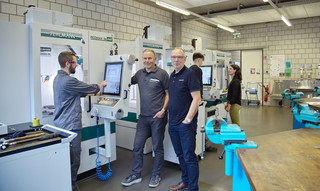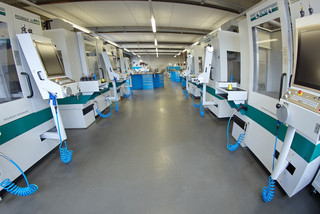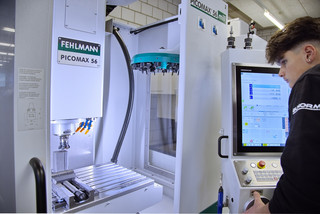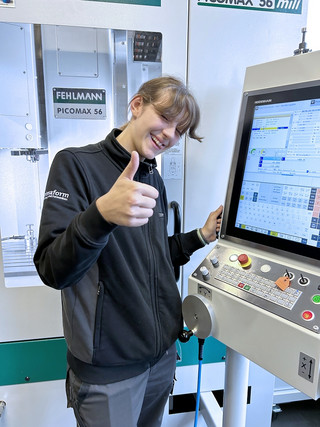Where champions are trained
With a centralized training location in Münchenbuchsee and investment in state-of-the-art PICOMAX 56 mill machine tools from Fehlmann, Swissmechanic Training AG/SA is setting new standards for the forward-looking training of tomorrow's MEM specialists.
From 2008/2009 onwards, Swissmechanic was confronted with a drastically changed situation for inter-company courses (üK) due to the new subsidizing policy of the canton of Bern and the vocational reform. Instead of a substantial amount for training investments, the canton of Bern now only reimbursed organizations a daily flat rate for the mandatory üK courses, in the case of polymechanics EFZ CHF 80 per apprentice per day. The vocational reform also required expensive investments in modern machinery, including CNC lathes and milling machines, while the decline of about 15% in the number of graduates had a negative impact on the number of apprenticeship contracts and, therefore, directly on the income from the courses.
Under these new conditions, Swissmechanic was no longer able to guarantee professional and cost-covering training in the canton of Bern with its decentralized structures comprising two sections and a total of five locations (in Biel, Langnau, Thun, and two in Langenthal).
Markus Kammermann, managing director of Swissmechanic Training AG/SA for 15 years: "We had to streamline, become 'lean' and exploit synergies to keep costs affordable for our members."
Markus Kammermann, who was familiar with lean and change management processes as well as concepts for "operational excellence" and "Kaizen" from his time as Deputy General Manager at Toyota Switzerland, took on the challenge: "The decision was made to focus on a centralized, bilingual training location. The goal was to provide the same training services at the new location in Münchenbuchsee with 20 percent less training infrastructure and costs than previously at five locations.
It was a mega-project that initially met with resistance, especially internally. 'We've always done it this way' (the seven most expensive words) was often quoted. So I am still proud today that we succeeded in turning lone warriors in their own little training kingdoms into a team that enjoys working together."
Consistent investment in modern CNC machine tools "made in Switzerland"
"Due to the current 'FutureMEM' vocational reform, we have reevaluated which investments are future-oriented and will bring the greatest benefit to our apprentices and their companies.
Today, trained polymechanics work in production on highly dynamic CNC machine tools with state-of-the-art CNC control technology and upstream CAD/CAM programming. We need to prepare our apprentices efficiently for this skill set and get them ready for real production conditions so that, after their basic training with us, they can play in the Champions League of cutting-edge technology. So the crucial question was which machine tools we wanted to use for training," says Markus Kammermann.
The following three options were available:
1. Revise the existing conventional milling machines and upgrade them with modern controls.
2. Purchase new CNC console milling machines with appropriate partial cladding.
3. Purchase new CNC milling machines with a modern design concept and full enclosure.
The available budget also played a central role. Markus Kammermann: "Although the price structure of these three options differs only slightly, we are talking about high investment costs in any case. Without our committed members, who unanimously voted in favor of investing in state-of-the-art machines for top-quality training and thus for a temporary increase in their membership fees, our options would have been severely limited."
Ultimately, the managers at Swissmechanic Training AG/SA decided on a consistent and comprehensive investment in eighteen PICOMAX 56 mil (3rd) CNC machine tools from Fehlmann. "At Swissmechanic, we follow the principle of 'Switzerland first' in all our investment decisions," adds Markus Kammermann.
PICOMAX 56 mill: Conventional and CNC milling machine in one
Markus Kammermann: "The PICOMAX 56 mill was also designed by Fehlmann specifically for the needs of basic training. In addition, it has the full range of functions of a fully-fledged 4-axis simultaneous machining center. In our view, this hybridity is unique on the market."
Jürg Solenthaler, Fehlmann AG Maschinenfabrik: "In fact, the development of the PICOMAX 56 mill was based on close cooperation with training companies, with Swissmechanic Training AG/SA in Münchenbuchsee playing a pioneering role. We clearly structured the requirements of Swissmechanic and other training companies in a catalog of requirements and developed a specific training solution together with CNC control specialist Heidenhain. The idea was that it could be used from the first day of training with purely manual operation to 4-axis simultaneous machining in preparation for the final apprenticeship exam and beyond. The respective functions, feeds, and speeds are easy for the trainer to configure and can be activated individually via key switch depending on the skills of the trainees. This starts with simple, manual operation of the axes via the three handwheels, continues with the simple functionality of a path control, and ends with full-fledged machining with the CNC path control, which allows milling at up to 12,000 rpm and complex milling processes such as high-feed or trochoidal milling.
Easy to adapt to the respective level of training thanks to its modular design
Jürg Solenthaler: "Together with Heidenhain and vocational training experts, we have developed a functional concept for the PICOMAX 56 mill that enables prospective polymechanics and production mechanics to use machine functionality tailored to their level of training from the very first hour to the final apprenticeship examination.
At the beginning of the training, purely manual options are available for conventional milling, drilling, and thread cutting using three mechanical handwheels—even without programming knowledge. The CNC functions are hidden and the screen display is reduced to the essentials. Step by step, the functionality of the control system can be activated. At the end, trainees have access to state-of-the-art 4-axis simultaneous CNC technology for the most complex components. And that is exactly where we want the apprentices of the future to be. At the end of their training, they should be able to program sophisticated components directly on the machine and in CAM and manufacture them efficiently and safely on CNC milling machines.
Experience and feel cutting forces
The decision to choose the PICOMAX 56 mill was not 100 percent certain during the evaluation phase, as Markus Kammermann explained to the SMM editorial team. "From a technical point of view, there was no debate – there is nothing comparable on the market. However, one point of discussion was how important it is for prospective polymechanics to feel the cutting forces and chip breaking behavior 1:1 on the hand wheels. Some of our vocational trainers consider this experience to be very important."
Jürg Solenthaler: "When you look at today's state-of-the-art machining processes, such as high-feed milling or trochoidal milling, CNC specialists are completely dependent on the cutting values provided by tool manufacturers. Today, this cutting data can be transferred online from the relevant portals directly to the CAM or CNC control system, and above all, a modern machine concept is needed that can implement this cutting data in a process-reliable manner."
Markus Kammermann: "Nevertheless, especially at the beginning of training, it certainly doesn't hurt to have experienced the cutting forces during a milling process. That's why we still use the Fehlmann PICOMAX 20 and 21 in our training center, where trainees can gain this experience."
Advantages of enclosure: greater safety
Another aspect to consider when choosing the right training machines is the cladding. At first glance, this may sound trivial. However, milling processes generate flying chips, swirling cooling lubricants, and noise emissions. From an occupational safety perspective, claddings are clearly beneficial and consistently prevent accidents. The admitted disadvantage of reduced accessibility to the workpiece and the manufacturing process should no longer play a major role in modern manufacturing. Markus Kammermann: "In my opinion, unprotected CNC machine tools are no longer appropriate, also from a safety perspective."
Space-saving thanks to ergonomic, compact design
The footprint is always an issue with machine tools. During the development of the PICOMAX 56 mill, great care was taken to ensure that it was no larger than a conventional milling machine. Jürg Solenthaler: "In terms of space requirements, the PICOMAX 56 mill can replace these older machines 1:1."
Future-oriented positioning of polymechanic training
Markus Kammermann: "Taking all of the above aspects into account, we consider full-fledged and 'hybrid' CNC milling machines, which are tailored to modern training, to be the ideal choice for aspiring polymechanics and production mechanics.
In order to attract young talent, we need to inspire enthusiasm with our training environment and position our training companies at the top of the league in terms of technology. Young people not only want to be trained in a technologically advanced workplace, but also in a safe and clean environment.
We at Swissmechanic Training AG/SA want to set a milestone with our investment in modern CNC machinery, in our case the Fehlmann PICOMAX 56 mill, and be pioneers in state-of-the-art CNC training in Switzerland. Because we must not forget what our USP is for global competitiveness in Switzerland: Better skills, better skills, better skills!
Last year after the WorldSkills competition in Lyon, Dominic Brügger from Halter AG in Frutigen said to Markus Kammermann: "Five years ago, I started my apprenticeship as a polymechanic EFZ with you, and today I am the fifth best in the world in the field of industrial mechanics." "This shows us that we are on the right track," says Markus Kammermann happily.
Contact
Swissmechanic Training SA
Bielstrasse 31, 3053 Münchenbuchsee
Markus Kammermann, Managing Director
Tel. 032 374 20 12
markus.kammermann@be.swissmechanic.ch
Kurt Aeschbacher, Head of Training
Tel. 032 374 20 30
kurt.aeschbacher@be.swissmechanic.ch
www.be.swissmechanic.ch/ausbildungszentrum




